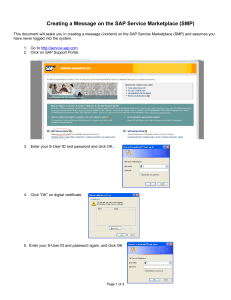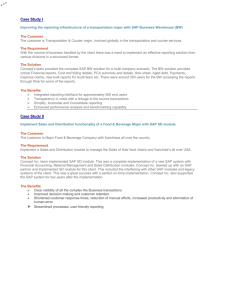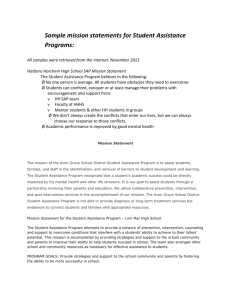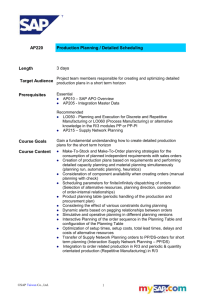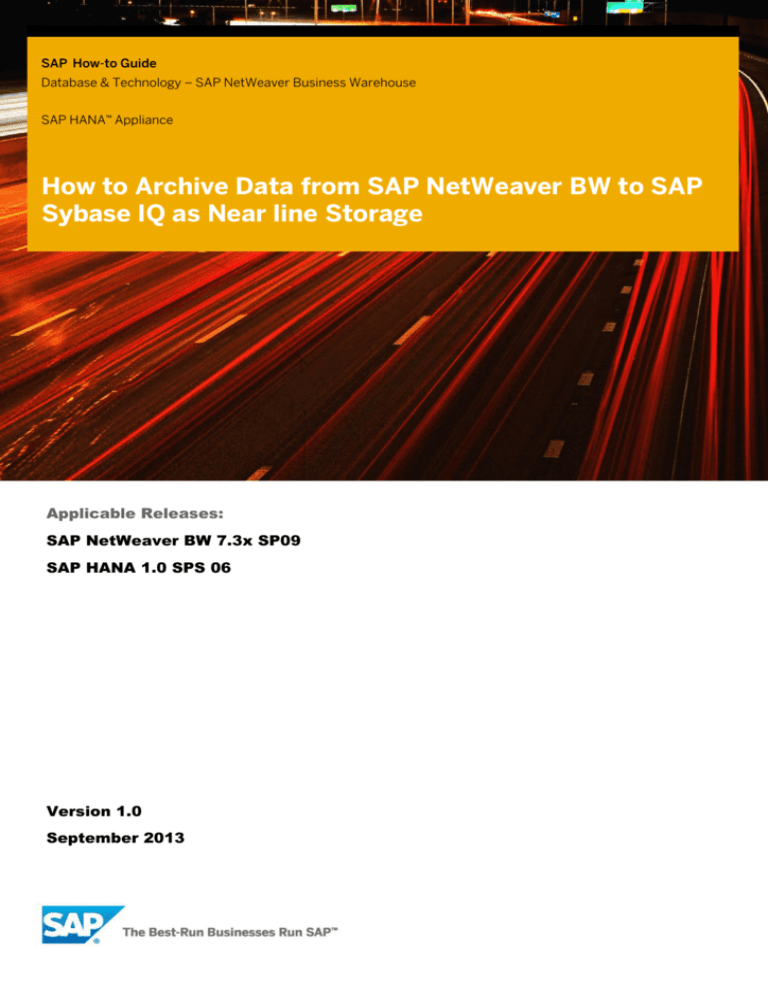
SAP How-to Guide
Database & Technology – SAP NetWeaver Business Warehouse
SAP HANA™ Appliance
How to Archive Data from SAP NetWeaver BW to SAP
Sybase IQ as Near line Storage
Applicable Releases:
SAP NetWeaver BW 7.3x SP09
SAP HANA 1.0 SPS 06
Version 1.0
September 2013
© Copyright 2014 SAP AG. All rights reserved.
No part of this publication may be reproduced or transmitted in any form or for any purpose without the express permission of SAP AG. The information contained herein may be changed without prior notice.
Some software products marketed by SAP AG and its distributors contain proprietary software components of other software vendors.
Microsoft, Windows, Excel, Outlook, and PowerPoint are registered trademarks of Microsoft Corporation.
by Netscape.
SAP, R/3, SAP SAP products and services mentioned herein as well as their respective logos are trademarks or registered trademarks of SAP AG in Germany and other countries.
All other product and service names mentioned are the trademarks of their respective companies. Data contained in this document serves informational purposes only. National product specifications may vary.
The information in this document is proprietary to SAP. No part of this document may be reproduced, copied, or transmitted in any form or for any purpose without the express prior written permission of SAP AG.
This document is a preliminary version and not subject to your license agreement or any other agreement with SAP. This document contains only intended strategies, developments, and functionalities of the SAP® product and is not intended to be binding upon SAP to any particular course of business, product strategy, and/or development. Please note that this document is subject to change and may be changed by SAP at any time without notice.
SAP assumes no responsibility for errors or omissions in this document. SAP does not warrant the accuracy or completeness of the information, text, graphics, links, or other items contained within this material. This document is provided without a warranty of any kind, either express or implied, including but not limited to the implied warranties of merchantability, fitness for a particular purpose, or non-infringement.
SAP shall have no liability for damages of any kind including without limitation direct, special, indirect, or consequential damages that may result from the use of these materials. This limitation shall not apply in cases of intent or gross negligence.
The statutory liability for personal injury and defective products is not affected. SAP has no control over the information that you may access through the use of hot links contained in these materials and does not endorse your use of th ird-party Web pages nor provide any warranty whatsoever relating to third-party Web pages.
SAP “How-to” Guides are intended to simplify the product
Business Objects and the Business Objects logo, BusinessObjects,
implementation. While specific product features and procedures typically
Crystal Reports, Crystal Decisions, Web Intelligence, Xcelsius, and other
are explained in a practical business context, it is not implied that those
Business Objects products and services mentioned herein as well as their
features and procedures are the only approach in solving a specific
respective logos are trademarks or registered trademarks of Business
business problem using SAP NetWeaver. Should you wish to receive
Objects Software Ltd. Business Objects is an SAP company.
additional information, clarification or support, please refer to SAP
Sybase and Adaptive Server, 365, SQL Anywhere, and other Sybase products and services mentioned herein as well as their respective logos are trademarks or registered trademarks of Sybase, Inc.
Consulting.
Any software coding and/or code lines / strings (“Code”) included in this
documentation are only examples and are not intended to be used in a
productive system environment. The Code is only intended better explain
and visualize the syntax and phrasing rules of certain coding. SAP does
not warrant the correctness and completeness of the Code given herein,
and SAP shall not be liable for errors or damages caused by the usage of
the Code, except if such damages were caused by SAP intentionally or
grossly negligent.
Disclaimer
Some components of this product are based on Java™. Any code change
in these components may cause unpredictable and severe malfunctions
and is therefore expressively prohibited, as is any decompilation of these
components.
Any Java™ Source Code delivered with this product is only to be used by
SAP’s Support Services and may not be modified or altered in any way.
Document History
Document Version
Description
1.00
First official release of this guide
Typographic Conventions
Type Style
Description
Example Text
Words or characters quoted
from the screen. These
include field names, screen
titles, pushbuttons labels,
menu names, menu paths,
and menu options.
Cross-references to other
documentation
Example text
Emphasized words or
phrases in body text, graphic
titles, and table titles
Example text
File and directory names and
their paths, messages,
names of variables and
parameters, source text, and
names of installation,
upgrade and database tools.
Example text
User entry texts. These are
words or characters that you
enter in the system exactly
as they appear in the
documentation.
<Example
text>
Variable user entry. Angle
brackets indicate that you
replace these words and
characters with appropriate
entries to make entries in the
system.
EXAMPLE TEXT
Keys on the keyboard, for
example, F2 or ENTER.
Icons
Icon
Description
Caution
Note or Important
Example
Recommendation or Tip
Table of Contents
1.
Introduction ...........................................................................................................................1
2.
Step-by-Step Procedure ...................................................................................................... 2
2.1
2.2
2.3
3.
InfoProvider Type Specific Features .................................................................................. 28
3.1
3.2
4.
Configuring Sybase IQ as a Near-Line Storage Solution ............................................. 2
2.1.1 The configuration steps in SAP NetWeaver BW ............................................. 2
2.1.2 Configuration Steps in Sybase IQ (optional)................................................... 8
Create Data Archiving Process in BW .......................................................................... 9
Read Archived Data ..................................................................................................... 19
2.3.1 BEx Query on Archived Data .......................................................................... 19
2.3.2 Reading NLS data in BW Transformations.................................................... 26
2.3.3 NLS data access for InfoProviders as sources within APD .......................... 27
Archiving of non-compressed data for InfoCubes..................................................... 28
Archiving of Write-Optimized DSOs ........................................................................... 29
Write into NLS with Process Chain .................................................................................... 31
4.1
Process Chain with Archiving Steps ........................................................................... 31
4.1.1 Write Phase ..................................................................................................... 32
4.1.2 Verification Phase ........................................................................................... 32
4.1.3 Deletion Phase................................................................................................. 33
How to Archive Data from SAP BW to Sybase IQ as Near Line Storage
1.
Introduction
This paper’s focus is the procedure of setting up and executing the archiving process with the
Sybase IQ NLS from the BW system.
For positioning, prerequisites and other relevant information please visit: new SCN page (Roland’s
current page: http://scn.sap.com/docs/DOC-39944).
The aim of this paper is to illustrate with screenshots the setup of the NLS-IQ solution for BW as
described in the online documentation Sybase IQ as a Near-Line Storage Solution
Please also always refer to the latest version of the documentation when executing the steps
described in this paper.
April 2014
1
How to Archive Data from SAP BW to Sybase IQ as Near Line Storage
2.
Step-by-Step Procedure
First, you will need to Create Database Connection and Configure Sybase IQ. Next you will use the
SAP BW system to create the archiving process to Archive SAP BW Data to Sybase IQ. Finally you
will check the archived request and test query access to data in the Sybase IQ for older data.
For detailed information on the Sybase IQ installation please refer the SAP First Guidance - SAPNLS Solution with Sybase IQ
2.1
Configuring Sybase IQ as a Near-Line Storage Solution
2.1.1
The configuration steps in SAP NetWeaver BW
For details refer to the SAP Online documentation: Configuring Sybase IQ as a Near-Line Storage
Solution
...
Create Database Connection
First create DB Connect - call transaction DBCO and create a database connection to Sybase IQ.
For more details, refer to SAP Note 1737415.
CAUTION
The DBCO user and the Sybase IQ user both have to be created with uppercase
letters.
Parameter SYBASE_IQ_CESU-8 under Connection Information must be set to 0 if you
use UTF8 as the character set.
Connection Info that works is:
SYBASE_SERVER=MELN50791806A.dhcp.wdf.sap.corp SYBASE_PORT=2638
SYBASE_IQ_ENGINE=MELN50791806A_iqdemo SYBASE_DBNAME=BDFNLS
SYBASE_CONTYPE=IQ SYBASE_IQ_LOAD=1 SYBASE_IQ_CESU-8=1 SYBASE_SQL_TRACE=1
SYBASE_IQ_LOCKWAIT=600 SYBASE_IQ_BUFFER_SIZE=500000
April 2014
2
How to Archive Data from SAP BW to Sybase IQ as Near Line Storage
Note
Ensure that Sybase IQ is up and running. (Refer to Appendix A).
The default password for user DBA delivered is ‘sql’. This needs to be changed for
security reasons.
Create Near-Line Storage Connection
1. Call transaction SPRO SAP NetWeaver Business Warehouse General Settings
Process Near-Line Storage Connection
2. Choose New Entries
3. Enter a name for the near-line storage connection. This name is then offered to you for
selection when you create a data archiving process.
April 2014
3
How to Archive Data from SAP BW to Sybase IQ as Near Line Storage
4. As the name, enter class CL_RSDA_SYB_CONNECTION.
5. Leave the Destination field empty
6. Enter a connection string under Connection Parameters. The connection string generally
comprises a list of name/value pairs, separated by a semi-colon.
Note
Each name/value pair must be entered as follows:
<Name of the parameter>=<Value of the parameter>
The following parameters are supported:
DBCON (required entry): The value of the parameter should be the name of the
database connection that you created in the first step.
BACKUP_REQUEST_EVENT (optional):
The value should be either DUMMY or the name of an event that has been defined in
the Sybase IQ database and which triggers a new data backup. If this parameter is
entered, and all data has been copied to Sybase IQ, the end of the write phase triggers
this event. This makes it possible to perform the data backup in Sybase IQ parallel to
the verification phase. Before the actual deletion process begins, the system checks
for a backup in Sybase IQ. The deletion phase cannot continue until this has happened.
April 2014
4
How to Archive Data from SAP BW to Sybase IQ as Near Line Storage
A special event called DUMMY triggers an event in the Sybase IQ database. It checks
for a more recent data backup however before the data in the request is deleted from
the BW database. The DUMMY event should therefore be used if database backups
are detected before the data is deleted and the data backups are automatically
created by the Sybase IQ database.
If the parameter is left out or does not contain any values, no event is triggered, and
the system does not check for data backups. You should only choose this setting in
non-productive systems.
BACKUP_WAIT_SEC (optional)
If the BACKUP_REQUEST_EVENT has been specified, and no data backup is detected
before the start of the deletion phase, the process waits for a period specified here in
seconds. If no data backup is detected during this period, the archiving request
terminates with error message RSDA_SYB197: "No new data backup since the end of
the copy phase. The current data backup ID is still <backup ID> of <timestamp>. The
parameters <backup ID> and <timestamp> refer to the columns bu_id and bu_time in
the sybase IQ system view SYSIQBACKUPHISTORY. All rows with the condition
selective_type in (1,2) are taken into account. This excludes all data backups that only
refer to read-only files. The archiving request only be restarted once the data backup
has been created.
PACKET_SIZE_MB (optional)
The package size of a single LOAD statement in MB. If this parameter is left out or
does not contain any values, the package size of the LOAD statement is exactly the
same as the package size of the FETCH of the online table. This is currently set to 20
MB. A package size greater than 2000 is ignored and replaced by 2000 MB.
7. Save your settings.
Tip
Use program ADBC_TEST_CONNECTION to test the DB connection to Sybase IQ
configured above:
Confirm the ODBC connection settings. In our example the ODBC connection has
been defined as follows:
April 2014
5
How to Archive Data from SAP BW to Sybase IQ as Near Line Storage
April 2014
6
How to Archive Data from SAP BW to Sybase IQ as Near Line Storage
April 2014
7
How to Archive Data from SAP BW to Sybase IQ as Near Line Storage
2.1.2
Configuration Steps in Sybase IQ (optional)
For details refer to the SAP Online documentation: Configuring Sybase IQ as a Near-Line Storage
Solution
These configuration steps in Sybase IQ are optional in order to integrate an automated data backup
mechanism.
...
1. Log on to Sybase IQ with user DBA via Sybase Central or IQISQL.
2. Create an event that triggers a new data backup. As the name of the event, enter the name
that you entered in step 6 for BACKUP_REQUEST_EVENT. The way the event is handled
depends on your data backup and data recovery strategy.
Example
The following event definition shows a very simple strategy. Here, a data backup is
always started whenever the event is triggered. The data backup files are stored in a
directory in the database's Home directory. The name of the database forms part of
the path name and of the file name:
CREATE EVENT BACKUP_REQUEST
HANDLER
BEGIN
-- Declare and set unique filename
DECLARE filename varchar(255);
SET filename = '../backup/' || db_name() || '/' || db_name() ||
'_' || dateformat(now(),'yyyymmdd_hhnnss.ssssss');
-- Perform incremental backup
BACKUP DATABASE FULL TO filename;
END
April 2014
8
How to Archive Data from SAP BW to Sybase IQ as Near Line Storage
2.2
Create Data Archiving Process in BW
For details refer to the SAP Online documentation: Creating Data Archiving Processes
Step-by-step procedure:
...
1. From the context menu of the InfoProvider (e.g. DataStore Object), choose Create Data
Archiving Process
2. Deselect the ADK-Based Archiving checkbox, enter the Near-Line Connection BDFNLS and
Check this connection.
April 2014
9
How to Archive Data from SAP BW to Sybase IQ as Near Line Storage
3. Check the status information for the selected Near-Line Connection and choose Continue
(Enter).
4. Enter selection profile if applicable
Note
April 2014
The fields that are available for selection are only the InfoProvider key fields
(highlighted in red).
If there is no time characteristic then you may not archive the data in the DSO.
Where there is no time characteristic in the key of the DSO then the
“characteristic for time slice” refers to a time characteristic in the data field of
the DSO (see pictures below). The primary partitioning characteristic refers to
the selection defined in the Data Archiving Process. The way archiving works is
that the system will select all primary partitioning characteristics that are older
than the date of the “characteristic for time slice.
10
How to Archive Data from SAP BW to Sybase IQ as Near Line Storage
The DSO key doesn’t contain any time characteristic.
The “characteristic for time slice” refers to a time characteristic in the data field of the DSO.
April 2014
11
How to Archive Data from SAP BW to Sybase IQ as Near Line Storage
5. Select semantic group if applicable
6. Accept the default settings on the Near-Line storage tab. Check and Activate your Data
Archiving Process.
April 2014
12
How to Archive Data from SAP BW to Sybase IQ as Near Line Storage
7. Check the Activation Log for the Data Archiving Process and leave the log by choosing
Continue (Enter).
8. Create Archiving Request. From the context menu of the InfoProvider choose Manage then
go to the Archiving tab and choose Create Archiving Request
Note
An icon appears next to the InfoProvider indicating that a Data Archiving Process was
created successfully.
April 2014
13
How to Archive Data from SAP BW to Sybase IQ as Near Line Storage
For additional details refer to Creating and Executing Archiving Requests
9. Simulate Execution of Data Archiving Request in Dialog
Note
The period referred to in “Only Data Records Older Than” is the number of
days/weeks/years relative to today (this is dynamic so can easily be used in process
chains).
The absolute value is a static fixed selection period
April 2014
14
How to Archive Data from SAP BW to Sybase IQ as Near Line Storage
The selection options provided in the restriction is based on the definition of the Data
Archiving Process Selection. Refer to step 4 above.
10.
You can simulate the Data Archiving Process from here – in the background (user
BWREMOTE is used) or in the foreground (user logged into BW)
Simulate the execution of the Data Archiving Request by choosing Only Simulate Request
Processing in Dialog
11. Ignore the warning No restrictions yet defined by choosing Continue (Enter)
Confirm “Do you want to continue processing in the dialog?” with Yes
April 2014
15
How to Archive Data from SAP BW to Sybase IQ as Near Line Storage
Check the displayed log for errors and choose Continue (Enter).
12. Create and execute the Data Archiving Request by choosing Create Request and Execute in
Background
April 2014
16
How to Archive Data from SAP BW to Sybase IQ as Near Line Storage
Note
The Data Archiving Process consists of 5 steps. This is reflected in the screen
dump above. You can run this in single steps or you can do this in one step
meaning you can simulate step 10 of the process, then step 20. This will assist
in error detection.
Setting the “Continue Processing until Target Status” to 70 will execute all
steps in one go.
It is recommended to use 70 for the manual approach. Alternatively split this
into step 40, 50 and 70 within a process chain. The reason for the split within
the process chain is to better assist with error handling
13. View the results of scheduled Job BI_ARCH-NLSDS01-CREATE
April 2014
17
How to Archive Data from SAP BW to Sybase IQ as Near Line Storage
Check the Job’s Status. You should see a successfully finished archiving job (BI_ARCHNLSDS01-CREATE). Leave the job overview by choosing Back
14. Check the Archiving Request
Click Refresh to refresh the Data Archiving Request list.
Your Data Archiving Request should now appear in the list.
April 2014
18
How to Archive Data from SAP BW to Sybase IQ as Near Line Storage
Leave the DataStore Object administration and the Data Warehousing Workbench by
choosing Back twice.
2.3
Read Archived Data
The archived data is accessible via BEx Queries, Transformations for DSO lookup and Analysis
Process.
2.3.1
BEx Query on Archived Data
With BW on HANA 7.30, you can now set up queries on MultiProvider and read the NLS partitions of
the PartProviders. Configuration for NLS use is possible on four different levels:
...
1. In the properties of the InfoProvider
2. In the properties of the PartProvider (from MultiProvider)
3. In the properties of the BEx Query Designer
4. Definition of a near-line storage variable for the query selection screen
The settings for NLS use on the four different levels are described below.
For additional details refer to the SAP Online documentation: Read Stored Data
1.
Properties of the InfoProvider:
In order to access archived data at InfoProvider level you have to change/adjust the InfoProvider
settings appropriately.
For all InfoProvider object basically two NLS settings are possible:
April 2014
19
How to Archive Data from SAP BW to Sybase IQ as Near Line Storage
Near-Line Access Switched Off (Default)
‘X’ Near-Line Access Switched On
For MultiProviders, an additional option is available:
‘P’ Near-Line Access Set the Same as for PartProvider
Depending on the type of the InfoProvider different settings are available.
2. Properties of the PartProvider:
NLS usage can also be delegated from the query level to the PartProvider level by using the
following settings:
BEx Query Designer: ‘Use Near-Line Storage According to Provider Settings’
MultiProvider: ‘Near-Line Access Set the Same as for PartProvider’
PartProvider: ‘Near-Line Access Switched On/Off
This configuration allows you to switch specific NLS PartProvider partitions on and off.
April 2014
20
How to Archive Data from SAP BW to Sybase IQ as Near Line Storage
3. Properties of the BEx Query Designer
The query definition is defined with NLS on the extended tab.
Options available for Near-Line Storage include:
April 2014
Use Near-Line Storage According to Provider Setting’ mode
Do Not Read Near-Line Storage
Read Near-Line Storage
21
How to Archive Data from SAP BW to Sybase IQ as Near Line Storage
4. Definition of a near-line storage variable for the query selection screen:
In the BEx Query Designer, you can also define an ‘NLS variable’ to let a specific query run either
in
April 2014
‘Read Near-Line Storage’ mode or
‘Do Not Read Near-Line Storage’ mode or
‘Use Near-Line Storage According to Provider Setting’ mode
22
How to Archive Data from SAP BW to Sybase IQ as Near Line Storage
Start the Query Monitor
You can start the Query Monitor from the SAP Easy Access Menu (SAP menu -> Business
Explorer -> BEx Monitor -> Query Monitor (= transaction RSRT1).
The “NLS read access” is the name of the selection variable. Now you can decide during query
execution if you want to report on archived data or not.
April 2014
23
How to Archive Data from SAP BW to Sybase IQ as Near Line Storage
This example illustrates results of the query using variable NLS set and without NLS access.
Example:
Read Near-Line Storage:
Do Not Read Near-Line Storage
The results of the query monitor are as follows:
Note
In the Statistics Data for the Query Runtime (transaction RSRT), you can see how
many PartProviders, including aggregates and near-line partitions (suffix $N),
effectively contribute to the query result.
The following is another example showing how data is queried on from NLS and live data
The $X reflects the active data. The $N reflects Near-line Storage (Sybase IQ).
April 2014
24
How to Archive Data from SAP BW to Sybase IQ as Near Line Storage
Values show 96 records which were archived and 48 remained in the DSO in for this
selection
Note
Two tables are generated in Sybase IQ for the InfoProvider. Once contains the actual
data. The other contains the MetaData. You can view data in Sybase IQ to validate that
the data is indeed correct
The screen shot display data archived using the Data Arching Process
The following screen shot displays the Data Arching Process Metadata.
April 2014
25
How to Archive Data from SAP BW to Sybase IQ as Near Line Storage
This above Sybase IQ table reflects the BW DAP below.
2.3.2
Reading NLS data in BW Transformations
For additional details refer to the SAP Online documentation: Reading Stored Data
Please refer to SAP notes 1028450 and 985609 for additional information.
April 2014
26
How to Archive Data from SAP BW to Sybase IQ as Near Line Storage
2.3.3
NLS data access for InfoProviders as sources within APD
As of SAP NetWeaver BW 7.30, the Analysis Process Designer is enabled to read data transparently
from the online partitions and near-line partitions. This makes it easy to include historically
archived data in your analysis process.
In the example shown in the following picture an APD process (TC: RSANWB) data is to be
extracted from Cube which is partly archived.
Select the source cube with the cursor and click the right mouse button. In the context menu you
can select the Properties….. Now you can select the option ‘Read Data from Near-Line Storage’.
April 2014
27
How to Archive Data from SAP BW to Sybase IQ as Near Line Storage
3.
InfoProvider Type Specific Features
For additional details refer to the SAP Online documentation: Creating Data Archiving Processes
3.1
Archiving of non-compressed data for InfoCubes
The option to archive non-compressed data was requested by customers for whom data
compression was a time consuming operation and did not really lead to significant compression
rates (highly granular data).
Data compression was a precondition for archiving InfoCube data since release BW 7.00. Before
data can be compressed, it must be:
distributed to subsequent data marts
rolled up to existing aggregates
As of SAP NetWeaver BW 7.30, it is no longer necessary to compress data before archiving. To
ensure data consistency in different data layers, the two preconditions above must be met before
data can be archived.
The flag ’Allow Archiving of Non-Compressed Data’ is a central setting in the data archiving
process.
Note
The flag can be changed in the Data Archiving Process (DAP) even if data has already
been archived. If you change this flag (Allow Archiving of Non-Compressed Data) in
the DAP definition, all archiving requests that are not completely finished (Status ‘70
Deletion Phase Confirmed and Request Completed’) must be finished in the old
‘Compression Mode’ or must be set to invalid before you can archive data in the new
‘Compression Mode’
April 2014
28
How to Archive Data from SAP BW to Sybase IQ as Near Line Storage
3.2
Archiving of Write-Optimized DSOs
For additional details refer to the SAP Online documentation: Special Features of Write-Optimized
DataStore Objects
The NLS solution allows for archiving of data from Write Optimized DSOs. The main difference
between settings for DAP for standard DSOS and write optimized DSOs is: data from write
optimized DSOs are archived request-based.
On the archiving request (context menu of an InfoProvider -> Manage-> Tab: Archiving) you can
still create a time related restriction:
April 2014
29
How to Archive Data from SAP BW to Sybase IQ as Near Line Storage
After starting the archiving process an additional request related restriction is generated:
As a result all request which contain data older than Time-restriction are archived in full. You can
check it in the Requests tab,
April 2014
30
How to Archive Data from SAP BW to Sybase IQ as Near Line Storage
4.
Write into NLS with Process Chain
For additional details refer to the SAP Online documentation: Scheduling Data Archiving Processes
Using Process Chains
Prerequisite is an “Active, executable” Data Archiving Process for your desired Info Provider.
4.1
Process Chain with Archiving Steps
The sequence of process chain using NLS is as follows (see screen):
...
1. Write Phase
2. Verification Phase
3. Deletion Phase
It is recommended to at least keep the delete process separately.
April 2014
31
How to Archive Data from SAP BW to Sybase IQ as Near Line Storage
4.1.1
Write Phase
Apply the following settings:
Continue Processing Until Target Status: “40 Write Phase Completed Successfully”
Auom- Request Invalidation After Error: “None”
4.1.2
Verification Phase
You need the following settings:
Continue Open Archiving Request(s) : Check
Continue Processing Until Target Status: “50 Verification Phase Ended Successfully”
Auom- Request Invalidation After Error: “None”
April 2014
32
How to Archive Data from SAP BW to Sybase IQ as Near Line Storage
Note
4.1.3
The Continue Open Archiving Request(s) Check box refer to whether there are
any preceding steps that have been executed
If the “All Open Archiving Requests” check box is selected then all open
requests for this InfoProvider will be processed – including manually managed
DAP’s as well as those that have not been processed by other processed chains
Deletion Phase
You need following settings:
Continue Open Archiving Request(s) : Check
Continue Processing Until Target Status: “70 Deletion Phase Confirmed and Request
Completed”
Auom- Request Invalidation after Error: “None”
Important
For InfoCubes with compressed data please note special archiving setting for the noncompressed data (Allow Archiving of Non-Compressed Data ). It the flag is not turned
on you have to compress your data in the cube before starting the archiving process.
E.g. include the compression step in the process chain prior the archiving steps.
April 2014
33
www.sap.com/contactsap
www.sdn.sap.com/irj/sdn/howtoguides



